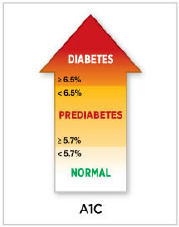
by Guest | Feb 3, 2018 | Being Well
By Autumn Bruce, BSN, RN and Operations Manager
As a key partner of the Year of Wellness (YOW), Tillamook County Community Health Centers (TCCHC) is supports this community-wide effort to reduce diabetes risk and improve disease management for individuals diagnosed with type 2 diabetes. With more than 11% of our county’s population already diagnosed with type 2 diabetes, it is imperative that we work together to prevent and manage disease risk for all residents.
There are many things people can do to reduce their risk. Having an A1C screening is the best, first step. Hemoglobin A1C (sometimes referred to as HbA1C) is a blood test that shows what a person’s average blood sugar level has been for the past 2-3 months. Doctors and nurses use this test for two reasons. 1) To see whether a person has diabetes, and 2) To monitor how well diabetes treatment is working.
While anyone could benefit from an A1C screening, people who are at a higher risk should be screened regularly. This includes individuals who are/have:
- Age 45 and older
- Overweight/obese, especially if excess weight is located around the mid-section
- Related to someone who has been diagnosed with diabetes
- Sedentary
- Part of a high-risk ethnic or racial group (e.g. African American, Hispanic, Native American, Asian American, and Pacific Islander)
- High blood pressure (greater than 140/90 mmHg)
- High triglyceride levels
- Polycystic ovary syndrome
- History of gestational diabetes
- History of vascular disease (heart disease and stroke)
- A1C greater than 5.7%, impaired glucose tolerance or impaired fasting glucose
When being screened for diabetes, a person’s A1C should be a score of 6 or less. If it is 6.5 or higher, it probably means the person has diabetes but they should be tested again, just to be sure. If A1C level is between 5.7 and 6.4, the individual is at risk for getting diabetes. In that case, it is recommended they begin doing things to prevent the condition from developing. Becoming more active, adopting a healthy eating pattern, quit use of tobacco products, and achieving moderate weight loss have all been shown to reduce diabetes risk. Often, a person will benefit from working with a mental or behavioral health professional to improve health habits to reduce risk. The goal is to return to normal blood sugar levels. It is important that lifestyle changes can and will be sustained for long-term success.
If someone has been diagnosed with diabetes, they will work with their primary care provider to identify the best course of treatment. This will include education and guidance to successfully adopt lifestyle changes. Additionally, A1C tests will show how well controlled their blood sugar is, with the goal of having a score of 7 or less. It is important to check with one’s doctor to know what your level should be. Not everyone with diabetes is the same. Some people need to aim for different A1C levels than others.
TCCHC, like other local providers, uses care managers who work with patients one-on-one to help them set SMART (Specific, Measurable, Achievable, Relevant and Time-bound) goals. They meet for 6-9 months for education and coaching to help the patient achieve their goals, and patients are seen by a behavioral health provider who helps them to manage their condition.
There are many great resources available to help, including the Living Well with Chronic Conditions program. Through group discussion, participants learn new ways to deal with issues caused by many chronic conditions. Over the six weeks, they cover such topics as handling stress, depression, talking to their provider, managing medications and fighting fatigue and frustration. There is no charge for this evidence-based class but registration is required by calling (503) 815-2270. Classes meet Tuesdays, February 21-March 28, 1:30-4:00 p.m. at NWSDS and September 5-October 10, 1:30-4:00 p.m. at the Herald Center.
Information Source: uptodate.com, an electronic clinical resource tool for physicians and patients.
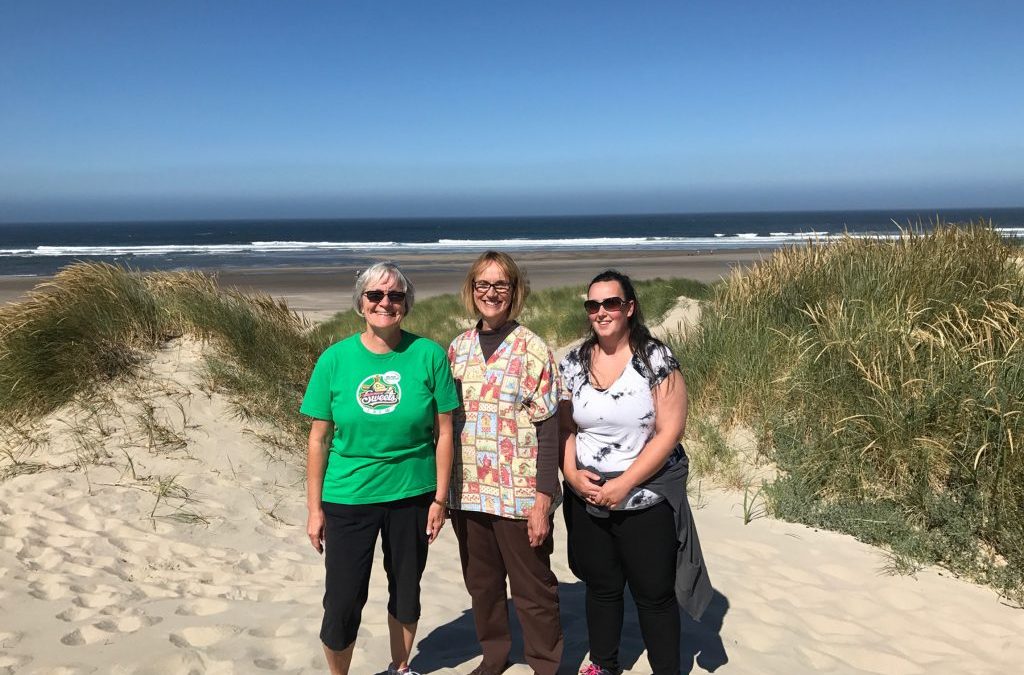
by Guest | Jan 27, 2018 | Being Well
By Leigh Ann Hoffhines, Communications Manager, Rinehart Clinic
Rinehart Clinic applauds Tillamook County Year of Wellness for its decision to focus on diabetes. The clinic’s healthcare team has long recognized the challenges patients with diabetes face and the impact the disease has on the health of the broader Tillamook County community. With roughly nine percent of Tillamook County residents diagnosed with type 2 diabetes, and nearly 33 percent of adults at risk for the disease, it merits our attention.
As the community becomes aware of the need for healthy lifestyle choices, we also need to make it easy for people to be active participants in their own health. From a patient’s perspective, the hardest step may be that first one: walking through the doors of a healthcare facility for treatment and education. The care team at Rinehart Clinic has found the single most important factor in bringing about positive change is creating a supportive environment for treatment and for group classes.
Last summer (July 2017), Rinehart Clinic launched a comprehensive Diabetes Risk Reduction Program made possible by grant funding from the Columbia Pacific Coordinated Care Organization. The program helps patients make positive strides towards overcoming some of the risk factors of diabetes, including obesity and sedentary lifestyles. The clinic holds a variety of healthy lifestyle classes throughout the seasons, shying away from traditional lecture-style trainings, and opting instead for informal and interactive conversations that are often driven by the participants themselves.
To help make it easier for patients to participate, the clinic offers incentives for patients who join in the programs. This past year, the clinic’s weight loss/walking group members received pedometers, healthy eating class participants went home with fresh vegetables each week, and many class members received vouchers for free fitness and aquatics classes at North County Recreation District.
The program has been in place since mid-2017 and the clinic is already seeing positive outcomes for participating patients: lowered blood sugar numbers (A1C), lower blood pressure, healthier eating habits, and even weight loss.
Rinehart Clinic’s class lineup includes:
– A Weighty Discussion series, which offers an informal conversation around healthy eating and weight loss. Some of the participants also joined in a weekly walking group during the summer months.
– The popular Art of Eating class, where patients learn how to increase the use of vegetables in their diets in healthy and creative ways.
– Living Well with Diabetes, which offers supportive tools to help patients manage diabetes and pre-diabetes conditions.
Several community partners who believe in the importance of a healthy community have rallied behind Rinehart Clinic’s Diabetes Risk Reduction Program:
- North County Recreation District, which provides fitness and aquatics passes for patients to help them become more physically active.
- Moon River Farms, a local organic farm that provides shares of vegetables through its Community Supported Agriculture (CSA) program for the Art of Eating classes.
- Manzanita Farmers Market offers participating patients vouchers for free fruits and vegetables at the market throughout the summer and fall program.
- Manzanita Grocery and Deli, long known for its commitment to the well-being of the community, is also offering a voucher program to provide fresh produce in winter when the local farms are not producing.
All of these programs and resources will continue at Rinehart Clinic throughout 2018. For information on upcoming class sessions visit www.rinehartclinic.org.
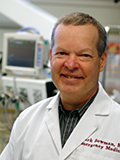
by Guest | Jan 13, 2018 | Being Well, Eat Well, Recipes
Everyone has heard the clichés, “Doctors are the worst patients,” or “Doctors don’t take their own advice.” It’s also the toll of the hours required in medical school and during residency that have an impact on the health of many MDs. Add in stress, poor sleep and poor diet and it’s the perfect storm for a chronic disease, such as Type 2 diabetes to be diagnosed. That’s exactly what happened to Dr. Mark Bowman.
Dr. Bowman and his family arrived at Adventist Health Tillamook Regional Medical Center in 1994. He was the first emergency-trained doctor to serve at TRMC. Before Tillamook, Bowman had gotten his medical degree at Ohio Northeastern Medical School in Emergency and Family Medicine, and then his residency in Toledo, Ohio. It was during this stressful time that Dr. Bowman was diagnosed with Type 2 diabetes. “I was shocked,” said Bowman. “How could a reasonably healthy guy in his mid-30’s have diabetes?” He continued, “But it added up – significant weight gain, not a healthy diet, on-the-go, grab and go food, lack of sleep and stress. That was the real trigger for my onset.”
With oral medications, a healthy diet and exercise, Dr. Bowman has been able to maintain and reduce is A1C levels. “There are so many other health impacts from increased A1C, cardiovascular disease, brain health, that’s why it’s important to know your numbers. It can be a silent disease,” he said.
Dr. Bowman is a good patient, and since he was diagnosed he’s taken the same dosage of medication, and made some adjustments to what and how he eats, moves and lives. He commented, “It’s cool to have a bunch of tools to use that can help manage a chronic disease like Type 2 diabetes, and I knew that to avoid some of the bigger consequences, I needed to do something, make some changes.” He continued, “I’ve had ups and downs, but I’ve never felt better.”
Another path opened up when Dr. Bowman was introduced to functional medicine. “About 4 or 5 years ago our daughter sent us this YouTube link that featured Dr. Mark Hyman talking about this specialty,” said Bowman. “After viewing it, my reaction was ‘this makes sense.’ And I began pursuing the training and certification.”
From the Institute of Functional Medicine: Functional Medicine determines how and why illness occurs and restores health by addressing the root causes of disease for each individual. “One condition can have many different causes, and how one cause can lead to many different conditions,” describes Mark Hyman, MD, IFM Board President. The Functional Medicine model is an individualized, patient-centered, science-based approach that empowers patients and practitioners to work together to address the underlying causes of disease and promote optimal wellness. It requires a detailed understanding of each patient’s genetic, biochemical, and lifestyle factors and leverages that data to direct personalized treatment plans that lead to improved patient outcomes.
By addressing root cause, rather than symptoms, practitioners become oriented to identifying the complexity of disease. Functional Medicine treatment targets the specific manifestations of disease in each individual.
“This is the future of medicine, the direction I’m excited to take my medical practice, and bring to our community,” said Bowman. “We are wired and tired. It’s about doing simple things, eating healthy and walking, but most importantly controlling stress, with mindfulness, yoga, activity, meditation. Figuring out what the combination is that works for you, for each individual,” he enthused.” This is another first in Tillamook County for Dr. Bowman as he is completing his certification in the specialty and is seeing patients one day a week at the Tillamook Medical Plaza as he sets up programs for his functional medicine practice. For more information, contact Dr. Bowman’s medical assistant at 503-815-6358.
Dr. Bowman’s Wrap It Up
YOW asked Dr. Bowman for one of his favorite recipes …
“This low carb wrap which relies on almond flour tortillas that I get in Portland at Whole Foods or Natural Grocers. I take one wrap and spread a healthy oil mayo with some protein (egg with or without cheese) and some cooked leafy greens with some jalapeno sauce. Yum! And less than 10 grams carbohydrate for a good start to the day!
This recipe has LOTS of flexibility and can be adapted to things you have on hand, such as leftover chicken or burger, rice or more
Wrap It Up
1 serving
Prep time: 10 minutes (or less)
1 tortilla (almond, flour, whole wheat, spinach)
Mayo (or use refried beans or pesto or …)
1 egg, scrambled
2 Tablespoons cheese (if desired)
Add meat, if desired
½ veggies cooked or uncooke
Warm in oven slightly before you head out the door; or microwave for 30 seconds. And as Dr. Bowman said, “YUM!”
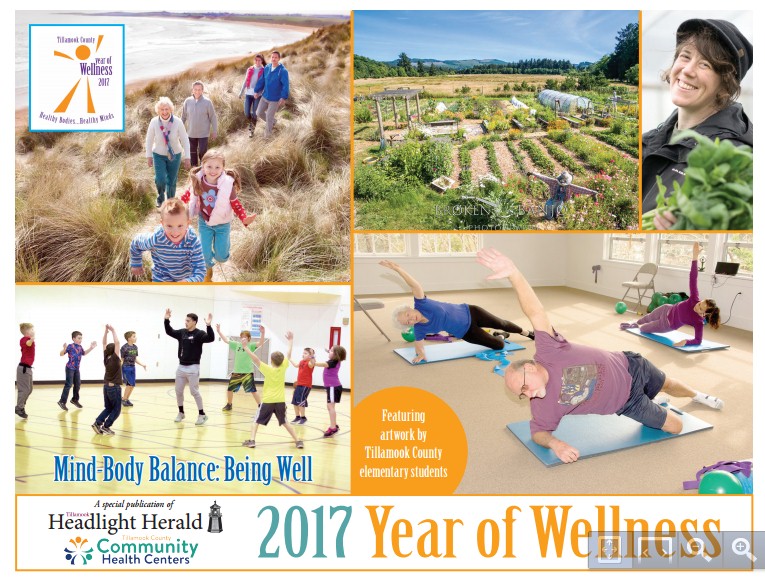
by Guest | Dec 29, 2017 | Being Well
By the YOW Leadership Team
As the second “Year of Wellness” draws to a close, we extend our gratitude to the community partners and volunteers who are helping to make Tillamook County a healthier place to live, work and play. Through the efforts of YOW’s Education & Outreach committee, the 2017 YOW Theme of “Mind -Body Balance: Being Well” ushered in several health education events organized and offered through YOW Committees and community partners.
Northwest Senior & Disability Services kicked off the year by bringing OSU bone health expert, Dr. Kathy Gunter to present in January. Dr. Arlene Taylor, brain researcher, was the featured speaker in February, sponsored by Adventist Health. In March, the YOW Nutrition committee held their “Eating Well, Being Well” workshop with nutrition expert Judy Barbe, sponsored by the Oregon Dairy & Nutrition Council, Oregon Food Bank Tillamook Services and OSU Extension.
April was a busy month with a campaign to “Move More” beginning with National Walking Day on the first Wednesday of April. Many local businesses and organizations participated in what is sure to be an annual event. Our Early Learning Hub partnered with Northwest Parenting and the Tillamook Family YMCA to offer a very successful Healthy Kids Day event featuring a Lego Block Party. The YOW Healthy Minds Team brought in speaker Ruth Wariner, to speak on her experiences of overcoming childhood trauma as featured in her book, The Sound of Gravel.
Our friends at the Greater Oregon Behavioral Health Institute (GOBHI) held an important Health Literacy event in North County in May and Tillamook Family Counseling Center’s (TFCC) Prevention Program began holding Community Conversations about problem gambling, substance use and suicide prevention.
YOW’s Active People & Healthy Communities committee worked hard all year to coordinate and promote programming that supports health and activity in Tillamook County. The summer months brought great opportunities for being active outdoors thanks to the folks at Tillamook Estuaries Partnership (TEP). Their Explore Nature event series, featuring everything from hikes to bird watching to mushroom treks, offer an outstanding way to learn more about where we live while being physically active. In addition, the Run Tillamook events drew thousands of walkers and runners from February through October. The Rinehart Clinic held several “Staying Well” events promoting emergency preparedness and safety in partnership with the North County Recreation District.
Adventist Health held their final Huckleberry Health Fair in August. In addition, Tillamook County Community Health Centers and Rinehart Clinic each held community health fairs, leading to many people getting needed screenings and follow up care. In September, YOW promoted hunger awareness and the Tillamook Food Bank and Food Roots Food Drive. YOW Healthy Minds partners, Columbia Pacific CCO and TFCC Prevention brought two important speakers in October, Charlie Slaughter’s Circle of Security Parenting Program and Robin Rose’s series of talks on healthy relationships and communication.
In November, YOW teamed up with Adventist Health to promote their annual “Diabetes and You” seminar. Several excellent speakers presented on nutrition, movement, and balance as well as the effects of eye and dental health in the prevention and management of Type 2 Diabetes.
Throughout the year, YOW ran health promotion messages through many platforms. The Headlight-Herald has generously featured a weekly Year of Wellness column. YOW partners contribute articles related to national health awareness campaigns and important wellness topics, and the YOW Nutrition committee provided a weekly recipe. This feature has helped highlight the resources, classes and events happening right here in our community that are relevant to our own citizens’ health needs.
Special thanks to KTIL for airing local public service announcements and monthly featuring YOW on Tillamook Today. Tune in to KTIL 95.9 FM on the second Friday of each month from 9:30-10:00 a.m. to catch the latest YOW news. Many of these recordings can be found on the YOW website along with video links to many of the 2017 events.
We thank Adventist Health, Tillamook Bay Community College and the Kiawanda Kapers for including YOW fitness classes and other health related information in their publications as well. Being connected and getting involved in one’s community is a great way to stay healthy. The Tillamook County Pioneer has been a terrific partner in helping to get the word out about YOW and other community partner events and activities. The on-line community calendar, tillamookliving.com, is another great resource for information. For a complete listing of wellness events, classes and blogs, visit the YOW website at tillamookcountyhealthmatters.org or download the Tillamook YOW app.
As we look ahead to 2018, YOW’s mission to help Tillamook County residents be healthier and happier will continue with a focus on diabetes prevention. With 10% of the population diagnosed with Type 2 diabetes and another 25% or more that are pre-diabetic or undiagnosed, YOW’s programs will look to lessen the impacts of chronic disease. With leadership of Tillamook County Commissioner Bill Baertlein and the continued collaboration of valued community partners, including Oregon Health Sciences University (OHSU) and Oregon State University, YOW’s momentum continues to encourage Tillamook County to eat well, move well, live well and think well.
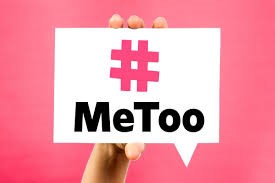
by Guest | Dec 16, 2017 | Being Well
(NOTE: This is a timely article with the recent naming of “The Silence Breakers” of the #MeToo movement selected as TIME Magazine’s “Person of the Year.” It’s important to recognize that sexual assault and sexual harassment exists in our community and most importantly, there are resources and help available for all.)
By Emily Fanjoy, Health Programs Coordinator, Tillamook County Women’s Resource Center
#Metoo, the hashtag that started in 2006 was popularized by Alyssa Milano this October after she posted it saying, “If all the women who have been sexually harassed or assaulted wrote ‘Me too’ as a status, we might give people a sense of the magnitude of the problem.” In the first 24 hours after Milano posted, more than 4.7 million people used the hashtag. Since October, accounts of sexual harassment and assault perpetrated by well known and admired men from Hollywood to the White House are surfacing. Survivors are telling their stories.
As author Brene Brown suggests, “maybe stories are just data with a soul.” We’ve had the data for years, quietly occupying space in research files. For example, a 2011 study by Potter & Banyard found that 38% of employed women have experienced harassment in the workplace. A more recent ABC News-Washington Post poll found that 54% of women have experienced “unwanted and inappropriate sexual advances” by men at some point in their lives, while 30% of women were subjected to this by a male colleague, and 25% identified men with power over their careers. To break it down, 1 in 2 women, 1 in 3 women, and 1 in 4 women, respectively. This compares to the 17-20% of men, or approximately 1 in 5, who experience harassment.
Daily we are hearing, seeing, reading, watching new accounts and stories, sometimes in brief and harrowing detail, yet the statistics above suggest that the stories we’ve heard thus far are just a fraction of the souls, the living breathing people, behind all that data. The impacts that these stories have on those who listen, read, and watch also merits addressing. Vicarious trauma or the cumulative effects of bearing witness to other’s suffering, and re-traumatization for survivors are legitimate concerns.
At the Tillamook Co. Women’s Resource Center (TCWRC) our mission is to eliminate domestic and sexual violence in Tillamook County. Since its founding in 1982 TCWRC volunteers, employees, partners and community supporters have worked to both offer support services to survivors of violence and to address root causes of violence. Every day employees and volunteers in the office bear witness to stories of fear, pain, and trauma. Every day we are responsible for recognizing the impact this has on our lives outside of work; on our outlook on life; and on our ability to also experience joy and connection in life.
As social activist and Trauma Stewardship author Laura VanDernoot Lipsky points out, so many cultural traditions support the idea that “in life there is equal measure of brutality and beauty, of pain and pleasure, of annihilating moments and of sublime moments.” This moment is one of reckoning, of grappling with ugly realities, and yet that is not the whole story. There are also moments of truth and courage, transitioning from isolation and into connection.
I recognize and honor the courage it takes for every individual who has stepped forward to publicly share their experiences of abuse. I share their hope that in the future this behavior will be so utterly unacceptable that it’s occurrence is rare, and that when it does occur the consequences for the individuals responsible for causing harm are swift and decisive.
At the same time, I recognize that reading, hearing, listening to such an overwhelming number of individual accounts has a profound impact on me a witness to other’s pain. The data, the vast numbers of people impacted, also implies that as witnesses to current events, many people posses a personal understanding of what work place harassment and sexual violence feel like. For survivors of any kind of sexual violence these stories can be triggering, setting off post-traumatic stress reactions, heightening a persons’ anxiety or depressive symptoms as the stories may sound similar to their own personal experience. If this is you, you are not alone. TCWRC advocates are here to support survivors regardless of how long ago the abuse occurred.
While others of us are fortunate enough to be concerned citizens without personal experience of violence, still repeated exposure to countless stories may cause us to experience heightened levels of anxiety or increased feelings of exhaustion, hopelessness, or despair. Vicarious trauma can impact all aspects of a person’s life, including how we are able to be with our friends and family.
How do we take care of ourselves as individuals in this period of national reckoning? How do we manage the nagging thought that it’s cruel to turn away? Brown, through her research, has also found that the most compassionate people are people who have healthy boundaries. This means that as individuals, we are responsible to take care of ourselves first in order to be fully present in supporting others–the oxygen mask rule of flying is not just an in-flight instruction. First, practice awareness of your feelings and bodily sensations. Second, when you notice you’re having difficulty with the topic, practice turning off the (insert: television, radio, social media account) that’s exposing you to other people’s stories, not forever, but for the moment.
Third, redirect yourself in a positive way.
For example, if I’m driving to or from work listening to news in the car, and I notice I’m holding my breath or only taking shallow breaths, this is a sign that I need break. I turn off the news and switch to music; I roll down the window and take deep breaths. I do not keep listening to the radio, because my body is sending me signals to stop and redirect myself. Finally, if that’s not enough, I also know who I can turn to when I need additional support.
TCWRC advocates and helpline are here to support you 24 hours a day, 7 days a week. In addition to our helpline, we offer individual counseling and support groups for survivors of violence including a new art based group for building resilience. If the courage and truth telling you’ve witnessed is motivating you to get involved, contact us to learn more about volunteer information and educational opportunities. Whatever you’re feeling in response to this maelstrom, know that you’re not the only one struggling through all of this. TCWRC is located at 1902 2nd St in Tillamook, OR, call our office at 503-842-9486 or toll free at 1-800-922-1679

by Guest | Dec 4, 2017 | Being Well
By YOW Staff
You’ve come a long way baby! This captures the progress made by Tillamook County’s Year of Wellness (YOW) campaign. Beginning as an idea of Commissioner Bill Baertlein in 2015, this grass-roots health improvement project was launched in 2016 and grew quickly from there. YOW was one local leader’s way to address rising chronic disease rates and healthcare spending. “If we can get people to take a few more steps each day and just eat a little healthier, then we will be doing something positive,” says Bill often. The idea is to put the control of community health into the hands of, well, the community.
By the end of 2016, over 75% of people surveyed had heard of YOW. More than 1,000 citizens had participated in the on-line health tracker and thousands more are looking at their daily habits in a new light. YOW also shifted how community partners viewed working together to influence population health. Healthcare leaders increasingly began to work toward community-wide solutions rather than just focusing on what could be done for a patient in the clinical setting. Social service agencies, schools, workplace wellness leaders and civic groups were recognizing the broader roles they could play in influencing “upstream” social determinants of health.
As 2017 approached, this positive energy and enthusiasm prompted the YOW Task Force to vote unanimously for its continuation. Since the beginning, YOW Committee members have volunteered hundreds of hours contributing to YOW’s success. Subject-area experts, passionate community advocates and everyday citizens have convened monthly to address topics including: health education, physical activity, nutrition, mental and behavioral health, tobacco prevention and public policy. These volunteers have helped identify which community resources can be leveraged to improve health (chronic disease prevention classes, outdoor recreation, community events, etc.) and where gaps exist which could be targets for improvement (safer sidewalks, more cooking classes, and increased social supports, to name a few.)
YOW’s progress is a remarkable thing. The health of Americans has been declining for decades. Experts tell us over and over which lifestyle changes we need to make to become healthier. Yet, somehow, health indicators have continued to move in the wrong direction. The reasons for this are complex but research is increasingly pointing to factors that we might not have previously realized impact our health, such as childhood stress and the conditions in which we live. “By working together to address these factors, and being ‘upstream-ist’ in our approach,” as Tillamook County Public Health Administrator, Marlene Putman states, “we stand to make greater gains in improving population health.”
Continuing YOW’s efforts and momentum into 2018, faced some challenges. There are simply too many health concerns and too few resources to address them all simultaneously. Conveniently, YOW was approached by researchers from the Oregon Health Sciences University (OHSU). They were intrigued by what we had started and wanted to lend their expertise. The goal for both OHSU and local leaders was to see if we could create a model for other communities to follow.
With the help of Jessica Linnell, OSU Extension Professor of Practice with the School of Community and Public Health, the YOW Task Force is now working in partnership with OHSU to narrow our focus to a specific health target which can be measured.
Through a series of workshops held during the Fall of 2017, the YOW Task Force has identified a goal of reducing the incidence of Diabetes in Tillamook County. We are in the process of developing a strategic plan, as well as methods of evaluating progress in reaching this goal. According to Commissioner Baertlein, “The great thing about this goal is that so many of the health factors that contribute to Diabetes, also contribute to other important health concerns, such as heart disease, stroke and cancer. This is a win-win in my opinion.”
Watch for the weekly “Year of Wellness” column in the Headlight-Herald to learn how you can help YOW reach this important community health goal.






